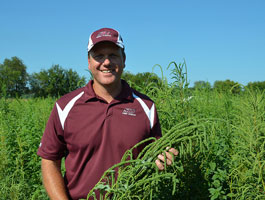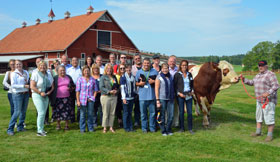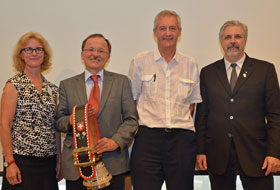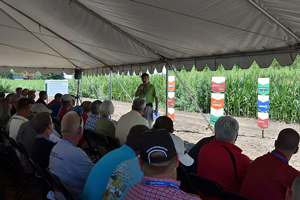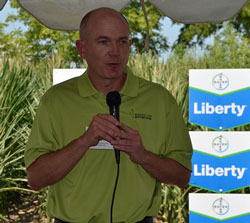 A new report from researchers at Purdue University shows that a waiver of the Renewable Fuels Standard (RFS) could lower corn prices… but it could be a while until livestock producers and consumers at the grocery stores see those prices go down. Purdue’s Wally Tyner, Farzad Taheripour and Christopher Hurt presented their report, entitled Potential Impacts of a Partial Waiver of the Ethanol Blending Rules, this morning during a Farm Foundation webinar, claiming that if the EPA grants the waiver, demand for corn would drop, and thus so would the prices, anywhere from 47 cents to $1.34 per bushel, depending on what level the drought impacts the final harvest, how big the waiver is, and how many unused Renewable Fuel Identification Numbers (RINs) are cashed in.
A new report from researchers at Purdue University shows that a waiver of the Renewable Fuels Standard (RFS) could lower corn prices… but it could be a while until livestock producers and consumers at the grocery stores see those prices go down. Purdue’s Wally Tyner, Farzad Taheripour and Christopher Hurt presented their report, entitled Potential Impacts of a Partial Waiver of the Ethanol Blending Rules, this morning during a Farm Foundation webinar, claiming that if the EPA grants the waiver, demand for corn would drop, and thus so would the prices, anywhere from 47 cents to $1.34 per bushel, depending on what level the drought impacts the final harvest, how big the waiver is, and how many unused Renewable Fuel Identification Numbers (RINs) are cashed in.
Tyner explained that technical and financial incentives could determine the impact of the waiver. “If refiners and blenders cannot change for technical reasons what they’re doing now, then a waiver has very little impact. But if they do have flexibility, then there is potential for a waiver having an impact,” Tyner said. Hurt added that there could be some unintended consequences, including what he calls demand destruction. “If we return to normal production in the next 12 months, then we have a fairly large supply, we have the possibility of looking at a 15 billion bushel corn crop with a utilization base of 11 billion bushels,” pointing out that we could see prices swing back to extremely low prices as quickly as they rose to these current high prices.
Paragon Economics’ Steve Meyer and the University of Minnesota’s Vernon Eidman were also listening in on the call and offering their perspectives. Meyer said the projected reduction in corn prices could translate into $2.60-3.50 per head on hogs. “We’re not talking about peanuts here.” But Eidman was quick to point out any RFS waiver would not impact corn use for ethanol this year. “It will take more time than that to get the rollback to occur,” Eidman said.
All on the webinar agreed that the EPA should not rush to issue any judgment until more complete information is known about the corn harvest, most likely in the next couple of months. “It’s important to get this right,” concluded Eidman.
It’s a really good conversation, and you can hear the entirety of it here: Farm Foundation-Purdue Webinar on Drought and RFS Waiver
You can see the associated slide show here.
 The 2012 IFAJ Congress has ended in Stockholm with the closing banquet in the Stockholm City Hall, site of the Nobel Prize banquet. We dined in the Golden Room. Congratulations to the Swedish Congress Committee for all their hard work and the enjoyment of seeing and experiencing their country.
The 2012 IFAJ Congress has ended in Stockholm with the closing banquet in the Stockholm City Hall, site of the Nobel Prize banquet. We dined in the Golden Room. Congratulations to the Swedish Congress Committee for all their hard work and the enjoyment of seeing and experiencing their country.
